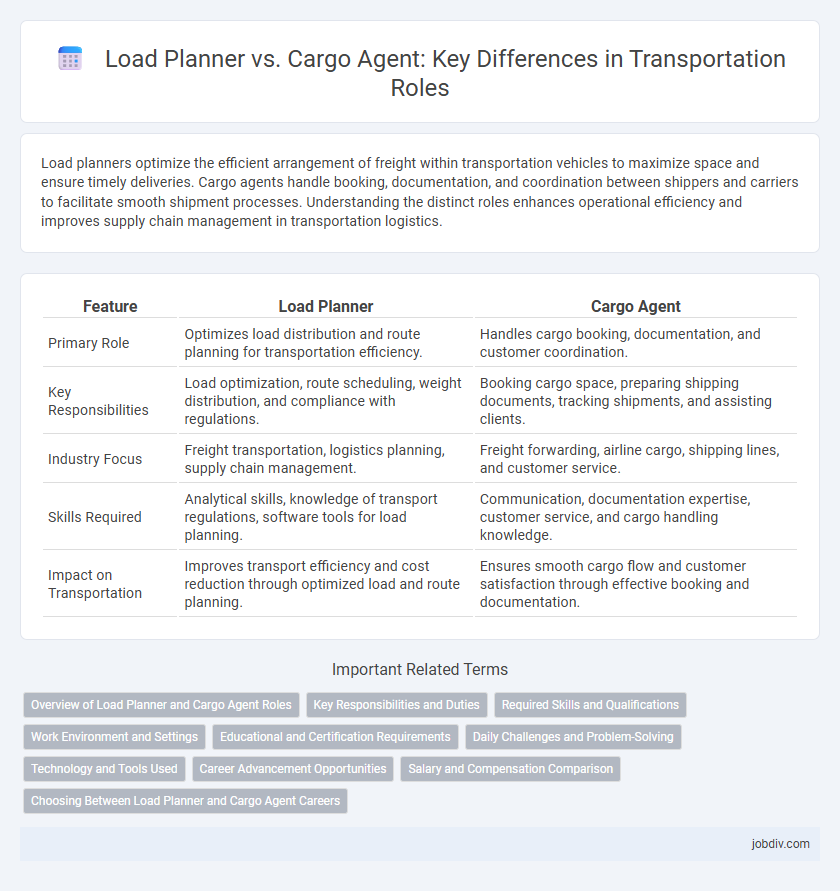Load planners optimize the efficient arrangement of freight within transportation vehicles to maximize space and ensure timely deliveries. Cargo agents handle booking, documentation, and coordination between shippers and carriers to facilitate smooth shipment processes. Understanding the distinct roles enhances operational efficiency and improves supply chain management in transportation logistics.
Table of Comparison
| Feature | Load Planner | Cargo Agent |
|---|---|---|
| Primary Role | Optimizes load distribution and route planning for transportation efficiency. | Handles cargo booking, documentation, and customer coordination. |
| Key Responsibilities | Load optimization, route scheduling, weight distribution, and compliance with regulations. | Booking cargo space, preparing shipping documents, tracking shipments, and assisting clients. |
| Industry Focus | Freight transportation, logistics planning, supply chain management. | Freight forwarding, airline cargo, shipping lines, and customer service. |
| Skills Required | Analytical skills, knowledge of transport regulations, software tools for load planning. | Communication, documentation expertise, customer service, and cargo handling knowledge. |
| Impact on Transportation | Improves transport efficiency and cost reduction through optimized load and route planning. | Ensures smooth cargo flow and customer satisfaction through effective booking and documentation. |
Overview of Load Planner and Cargo Agent Roles
Load planners coordinate shipment schedules, optimize freight loads, and ensure efficient use of transportation resources to reduce costs and improve delivery times. Cargo agents handle the booking, documentation, and tracking of shipments, acting as intermediaries between carriers and customers to facilitate smooth cargo movement. Both roles play vital parts in logistics operations, with load planners focusing on operational efficiency and cargo agents on customer service and compliance.
Key Responsibilities and Duties
Load planners coordinate shipment schedules, optimize load distribution, and ensure compliance with transportation regulations to maximize efficiency and reduce costs. Cargo agents handle customer interactions, process shipping documentation, and arrange cargo pick-up and delivery logistics to maintain smooth operations. Both roles focus on timely and safe transportation but differ in scope: load planners emphasize planning and optimization, while cargo agents prioritize customer service and cargo handling.
Required Skills and Qualifications
Load planners require strong analytical skills, proficiency in logistics software, and knowledge of load optimization and weight distribution principles. Cargo agents must possess excellent communication abilities, customer service skills, and familiarity with shipping documentation and regulations. Both roles demand attention to detail, problem-solving capabilities, and understanding of transportation safety standards.
Work Environment and Settings
Load planners primarily operate in office environments, utilizing logistics software to coordinate shipments and optimize load efficiency, often collaborating with dispatchers and warehouse personnel. Cargo agents work in both office settings and transportation hubs like airports or shipping terminals, managing cargo documentation and ensuring proper handling during transit. Both roles require strong communication skills but differ in their exposure to on-site operational settings versus behind-the-desk planning.
Educational and Certification Requirements
Load planners typically require specialized training in logistics, supply chain management, or transportation with certifications such as Certified Load Planner (CLP) enhancing their qualifications. Cargo agents often need formal education in freight forwarding or international trade and benefit from certifications like the Certified Cargo Specialist (CCS) to demonstrate expertise. Both roles demand knowledge of regulatory compliance and safety standards, but load planners emphasize route optimization and load distribution, while cargo agents focus on documentation and customer service.
Daily Challenges and Problem-Solving
Load planners manage complex schedules to optimize cargo space utilization while handling last-minute changes and ensuring compliance with weight and volume restrictions. Cargo agents coordinate the physical movement of shipments, resolving real-time issues such as delayed pickups, documentation errors, and communication gaps between carriers and clients. Both roles require swift problem-solving to minimize delays and maintain supply chain efficiency in dynamic transportation environments.
Technology and Tools Used
Load planners utilize advanced software like TMS (Transportation Management Systems) and AI-driven optimization tools to efficiently allocate shipments and routes, enhancing load capacity and reducing costs. Cargo agents rely heavily on digital tracking platforms, electronic documentation systems, and customer relationship management (CRM) tools to coordinate cargo handling, ensure regulatory compliance, and maintain communication between shippers and carriers. Both roles leverage technology for streamlined operations, but load planners focus more on strategic shipment consolidation while cargo agents emphasize real-time cargo coordination and documentation accuracy.
Career Advancement Opportunities
Load Planners often experience faster career advancement due to their critical role in optimizing shipment efficiency and logistics planning, which directly impacts company profitability. Cargo Agents typically progress through customer service expertise and operational knowledge, with opportunities to move into supervisory or sales roles within freight and cargo companies. Specializing in data analysis and cross-border regulations further enhances promotion prospects for professionals in both positions.
Salary and Compensation Comparison
Load planners typically earn an average salary ranging from $50,000 to $70,000 annually, reflecting their role in optimizing freight loads and coordinating shipments. Cargo agents usually have a slightly lower salary range, approximately $40,000 to $60,000 per year, due to their focus on customer service and cargo documentation. Compensation packages for both positions may include bonuses and benefits tied to performance and efficiency in the transportation and logistics sectors.
Choosing Between Load Planner and Cargo Agent Careers
Choosing between a load planner and a cargo agent career depends on preferences for operational accuracy versus customer interaction. Load planners specialize in optimizing freight space and ensuring safe, efficient loading to minimize costs and delays. Cargo agents focus on documentation, coordinating shipments, and managing client communications to facilitate smooth cargo movement.
Load Planner vs Cargo Agent Infographic

 jobdiv.com
jobdiv.com